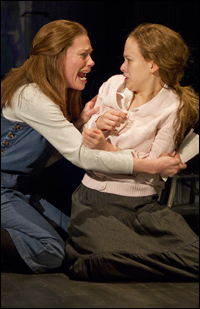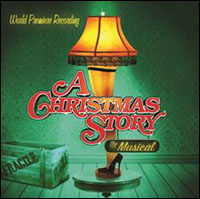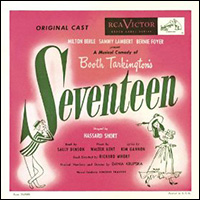
*
Carrie [Ghostlight]
Since time began, authors of flop musicals have embroidered the legend "if only they hadn't messed it up" on their throw pillows, or wherever it is authors of flop musicals embroider such stuff. The "they" being producers or directors, sometimes choreographers or stars, and — in rare examples — the lyricist blaming the composer or the librettist blaming both.
In some cases, said authors — who over the years have dreamed of "fixing" their little fiasco — ultimately manage to convince someone to bankroll a second try. The number of times the retread works better than the original are all but nonexistent. The main exception seems to be Wright & Forrest's At the Grand, which folded on the road in 1958 and reappeared in 1989 as Grand Hotel; this with a significant chunk of the authors' treasured score ignominiously scrapped in Boston, replaced with songs by a much younger and much better tunesmith.
Add to the annals of forlorn second-chances the 1988 Carrie, which was the stuff of legends when the RSC production flopped in Stratford-upon-Avon (starring Barbara Cook) and went on to altogether bomb at Broadway's Virginia in 1988 (starring Betty Buckley). But what's a little adversity?
 |
||
| Marin Mazzie and Molly Ranson |
||
| photo by Joan Marcus |
But it's still, alas, Carrie.
Visit PlaybillStore.com to view theatre-related recordings for sale.
 |
||
| Cover art |
Pasek and Paul do some very nice things here; they are a songwriting team you should hear, and watch.
Visit PlaybillStore.com to view theatre-related recordings for sale.
 |
||
| Album art |
Seventeen opened at the Broadhurst in June 1951 — grabbing the theatre from the auspicious flop, Flahooley — and made it through Thanksgiving, clocking in at 182 performances. The personnel list is all but unknown. Walter Kent and Kim Gannon wrote music and lyrics, respectively; no, you probably have never heard of them. But you've heard one of their WWII songs, "I'll Be Home for Christmas." Kent also wrote "(There'll Be Bluebirds Over) The White Cliffs of Dover." Sally Benson, of Junior Miss fame, wrote the book. Richard Whorf, who was perhaps better known as an actor, directed the book; the 74-year-old Hassard Short, director of such long-ago hits as The Band Wagon and Lady in the Dark, was credited with the overall staging. The cast featured almost nobody you ever heard of, the main exception being Kenneth Nelson — later prominent in The Fantasticks and The Boys in the Band — as the leading man. Or, rather, the 17-year-old hero.
The wild card in the bunch was first-billed producer Milton Berle, who was just then the most famous man on television. "Mr. Television," in fact; his weekly variety show was so popular that NBC went and signed him to a 30-year contract. (This didn't work out too well for NBC, as the popularity of "Uncle Miltie" started to slip after five years.) In 1951, Berle was on top; I can only guess that the actual producer of Seventeen, former stage manager Sammy Lambert, figured that Berle's name would attract attention. Which it did and does, 'cause we're talking about it now, 60 years later. The presence of Berle's name — presumably in exchange for a slice of the profits, sans investment — certainly helped the show receive attention in the same way that a play "produced" by Oprah Winfrey would today. I don't imagine that fans of the rough and tumble Uncle Miltie found much to like in the nostalgically well-mannered and sweetly pastoral Seventeen. The original cast album reveals a moderately pleasant musical, suitable for general audiences but with a few tasty morsels. Tastiest of all is a song-and-dance for Ann Crowley — as Lola Pratt, the flirtatious visitor from out-of-town who stirs up all the trouble — called "Reciprocity." This has a delicious dance arrangement (by Jesse Meeker) and dance orchestration (credited to Ted Royal, but probably with the vocal by Royal and the pizzicato-plucking dance by some unknown somebody).
Other numbers I turn back to include "This Was Just Another Day," a duet for Nelson and Crowley; and an unusual trio for Nelson and two olde-South servants — one of 'em called "Pappy" — called "I Could Get Married Today." This is, indeed, the first and only authorized CD version of Seventeen, as they say in the release. There was a U.K. release of the album some years back, which I addressed in a column in 2005, although Masterworks gives us a new digital remastering from the original tapes that sounds much better.
Visit PlaybillStore.com to view theatre-related recordings for sale. (Steven Suskin is author of "Show Tunes" as well as "The Sound of Broadway Music: A Book of Orchestrators and Orchestrations," "Second Act Trouble," the "Broadway Yearbook" series and the "Opening Night on Broadway" books. He also pens Playbill.com's Book Shelf and DVD Shelf columns. He can be reached at [email protected].)

Matthew-Murphy.jpg)







